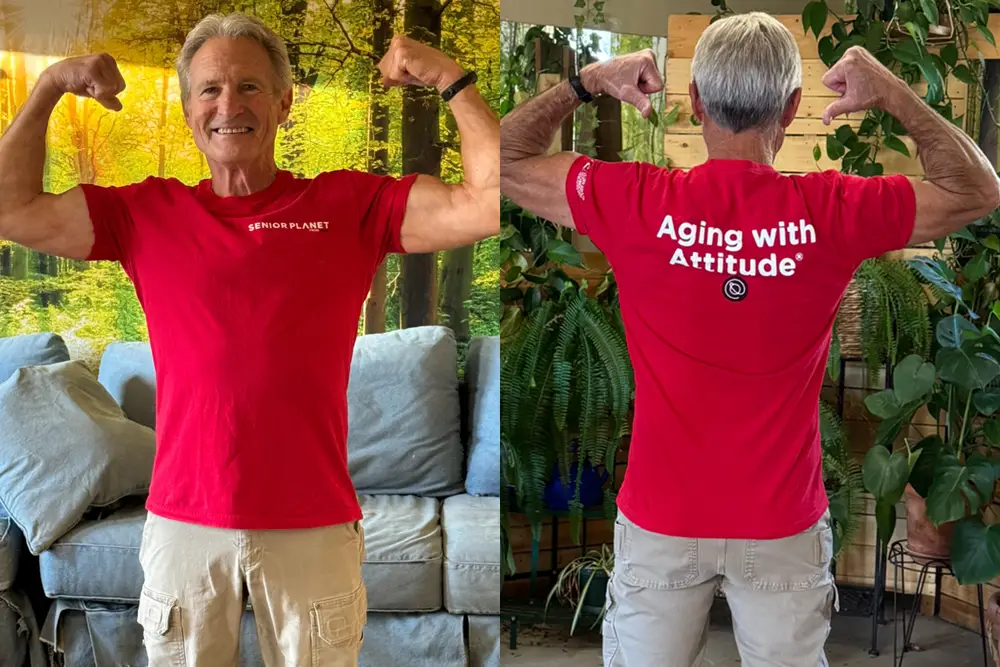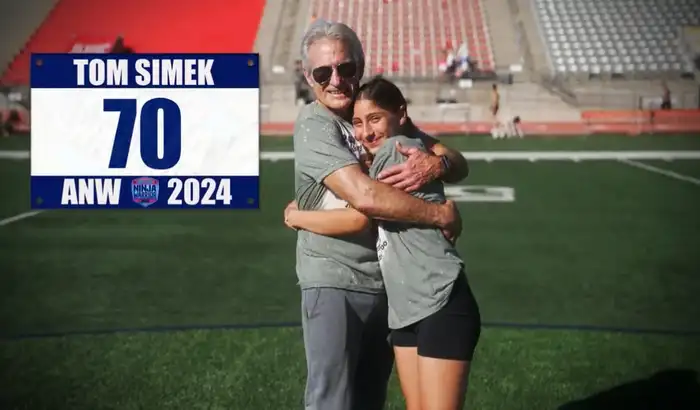A 72-year-old ‘American Ninja Warrior’ competitor didn’t get fit until his 50s. He shared 4 ways working out has improved his life.

Tom Simek, 72, is an “American Ninja Warrior” competitor and Senior Planet sponsored athlete.
At age 59, Tom Simek was out of shape.
The retired building contractor based in Santa Fe had spent his working life prioritizing his family and business over his health. After he was diagnosed with osteoporosis, high cholesterol, and sleep apnea 13 years ago, he decided to make some healthy lifestyle changes, he told B-17.
Simek made small changes at first: he stopped working weekends, ate healthier, and started exercising daily.
“It was gradual,” he said. First he started walking, then incorporated bodyweight exercises such as push-ups, crunches, dips, and jumping jacks.
“And then I found a sport that I loved to do: track and field,” he said.
Now aged 72, Simek has competed on the TV competition “American Ninja Warrior” twice, is sponsored by Senior Planet, a program that encourages older adults to exercise, and works out for about an hour each day. Some days, he spends the hour doing boot camp classes at his daughter’s fitness club, while others he does short sprints and weights in his home gym.
In 2012, Simek entered his first National Senior Games, a state and country-wide competition for athletes over 50. Every year since, he has competed in the long jump and the 50-meter, 100-meter, and 200-meter sprints, consistently winning medals for his state, New Mexico.

Simek has competed on the TV show “American Ninja Warrior” twice.
Simek shared four ways getting fit has improved his quality of life.
1) A sense of purpose
Track and field has become Simek’s passion. “And if you’re passionate about something, then you will look forward to your workouts in order to improve yourself. It gives me a reason to wake up in the morning,” he said.
Spurred on by his 12-year-old granddaughter, he also keeps up his training for “American Ninja Warrior,” which he appeared on in 2019 and 2022, in case he’s chosen to compete in future seasons. He does bodyweight exercises such as pull-ups to maintain his strength, practices gymnastics, and works on his balance.
Having a sense of purpose has been linked to longevity in multiple studies. In one 2019 study by researchers at the University of Michigan, US adults aged over 50 who had a strong sense of purpose were less likely to die within four years.
2) Making new friends
Simek loves that sports help him meet lots of new people. At track and field competitions, “younger people come up to me because they see my age, and say ‘you inspire us,'” he said.

Simek loves that he can compete in track and field competitions with his granddaughter.
And he’s made friends across the country at the Senior Games. “I think it’s very important, in the senior years, to stay connected with people,” he said.
A 2023 study found that older people who had more social interactions were likely to live longer than those who were more isolated.
3) Better mobility
Because he’s fit and mobile, Simek can do activities with his grandchildren, whether playing or competing in track and field competitions alongside his granddaughter. This is particularly important to him because he wants to show her the importance of a fit and active lifestyle as she grows up, he said.
Mobility in older age is a predictor of living longer. A 2017 study published in BMC Health Services Research on 1,005 people aged 65 and above still living at home found that the longer it took participants to leave a chair, the greater their risk of dying within the next 11.8 years.
4) Better sleep
“When you’re fit, your mind works better, and you sleep better,” Simek said.
In a 2021 study published in Experimental Gerontology, people over 65 who were more physically fit — meaning they were able to perform more actions such as standing from a seated position and doing bicep curls — were more likely to have a better health-related quality of life.
And research shows that being physically active is linked to better sleep quality, according to Dr. Charlene Gamaldo, the medical director of Johns Hopkins Center for Sleep.






